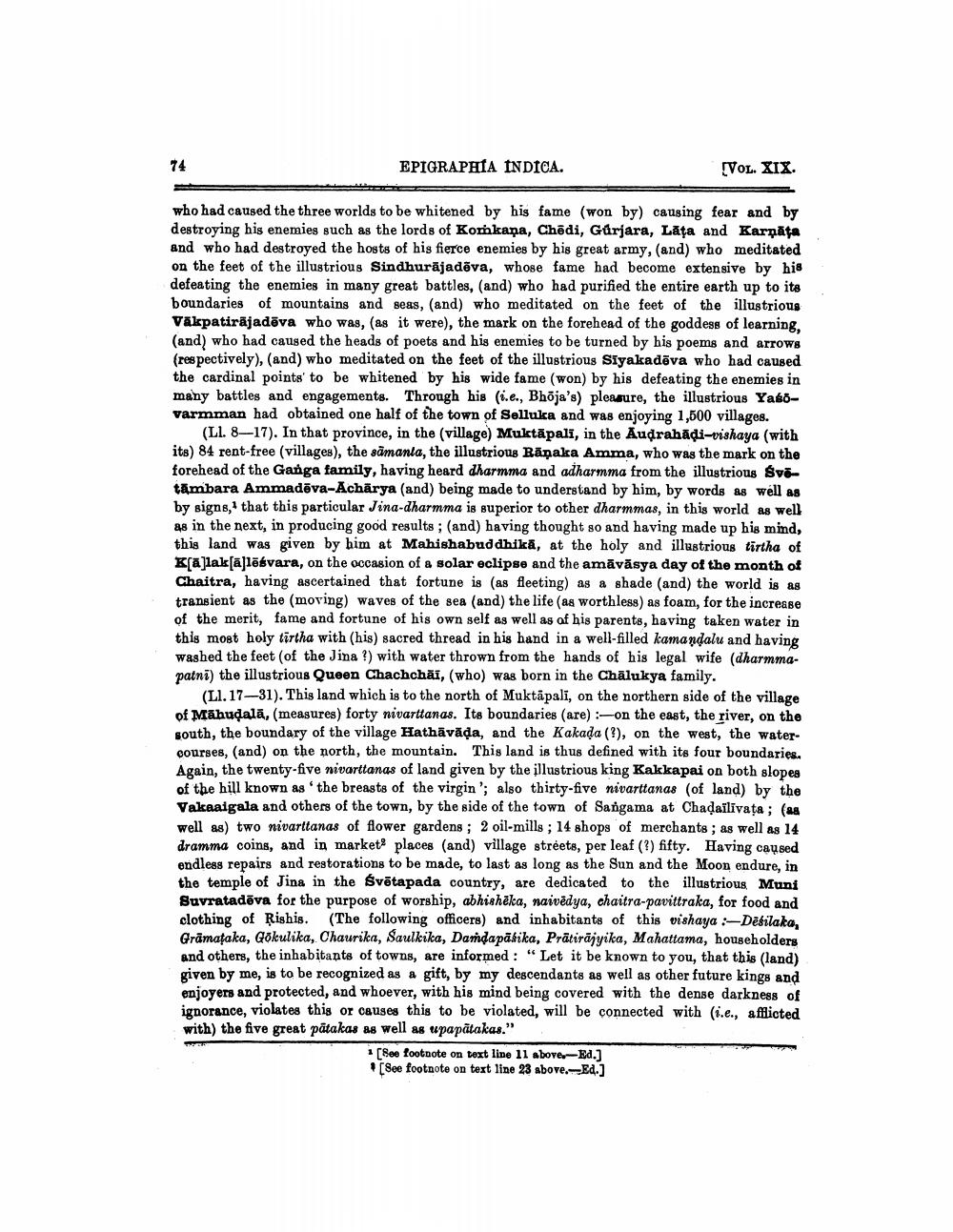________________
74
EPIGRAPHIA INDICA.
[VOL. XIX.
who had caused the three worlds to be whitened by his fame (won by) causing fear and by destroying his enemies such as the lords of Korkana, Chedi, Gurjara, Lata and Karņāţa and who had destroyed the hosts of his fierce enemies by his great army, (and) who meditated on the feet of the illustrious Sindhurājadeva, whose fame had become extensive by his defeating the enemies in many great battles, (and) who had purified the entire earth up to its boundaries of mountains and seas, (and) who meditated on the feet of the illustrious Vākpatirājadēva who was, (as it were), the mark on the forehead of the goddess of learning, (and) who had caused the heads of poets and his enemies to be turned by his poems and arrows (respectively), (and) who meditated on the feet of the illustrious Siyakadeva who had caused the cardinal points' to be whitened by his wide fame (won) by his defeating the enemies in many battles and engagements. Through his (i.e., Bhoja's) pleasure, the illustrious Yasovarmman had obtained one half of the town of Selluka and was enjoying 1,500 villages.
(Ll. 8-17). In that province, in the (village) Muktapali, in the Auḍrahadi-vishaya (with its) 84 rent-free (villages), the sämanla, the illustrious Räpaka Amma, who was the mark on the forehead of the Ganga family, having heard dharmma and adharmma from the illustrious Švōtambara Ammadova-Acharya (and) being made to understand by him, by words as well as by signs, that this particular Jina-dharmma is superior to other dharmmas, in this world as well as in the next, in producing good results; (and) having thought so and having made up his mind, this land was given by him at Mahishabuddhikā, at the holy and illustrious tirtha of K[a]lak[āllēśvara, on the occasion of a solar eclipse and the amāvāsya day of the month of Chaitra, having ascertained that fortune is (as fleeting) as a shade (and) the world is as transient as the (moving) waves of the sea (and) the life (as worthless) as foam, for the increase of the merit, fame and fortune of his own self as well as of his parents, having taken water in this most holy tirtha with (his) sacred thread in his hand in a well-filled kamandalu and having washed the feet (of the Jina ?) with water thrown from the hands of his legal wife (dharmmapatni) the illustrious Queen Chachchai, (who) was born in the Chalukya family.
(Ll. 17-31). This land which is to the north of Muktapali, on the northern side of the village of Mahuḍalā, (measures) forty nivarttanas. Its boundaries (are) :-on the east, the river, on the south, the boundary of the village Hathāvāḍa, and the Kakada (?), on the west, the watercourses, (and) on the north, the mountain. This land is thus defined with its four boundaries. Again, the twenty-five nivarttanas of land given by the illustrious king Kakkapai on both slopes of the hill known as 'the breasts of the virgin'; also thirty-five nivarttanas (of land) by the Vakaaigala and others of the town, by the side of the town of Sangama at Chaḍailivata; (as well as) two nivarttanas of flower gardens; 2 oil-mills; 14 shops of merchants; as well as 14 dramma coins, and in market places (and) village streets, per leaf (?) fifty. Having caused endless repairs and restorations to be made, to last as long as the Sun and the Moon endure, in the temple of Jina in the Svētapada country, are dedicated to the illustrious Muni Suvratadova for the purpose of worship, abhisheka, naivedya, chaitra-pavittraka, for food and clothing of Rishis. (The following officers) and inhabitants of this vishaya :-Desilaka, Grāmataka, Gökulika, Chaurika, Saulkika, Damdapātika, Prātirajyika, Mahattama, householders and others, the inhabitants of towns, are informed: "Let it be known to you, that this (land) given by me, is to be recognized as a gift, by my descendants as well as other future kings and enjoyers and protected, and whoever, with his mind being covered with the dense darkness of ignorance, violates this or causes this to be violated, will be connected with (i.e., afflicted with) the five great patakas as well as upapātakas."
1 [See footnote on text line 11 above.-Ed.] [See footnote on text line 23 above.-Ed.]




